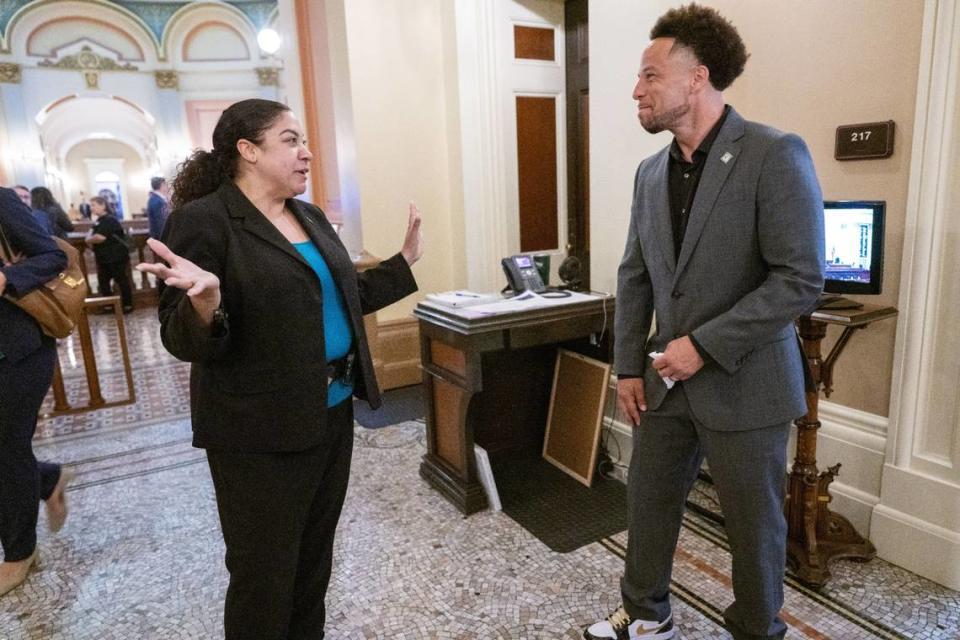California Senate bill could help pave the road to Black students’ college success. Here’s how
A new movement to identify California colleges and universities that serve Black students is growing inside the state Capitol and on campuses including Sacramento State, which has established itself as a hub for African-American students in the Golden State and beyond.
A proclamation Thursday before the California State Assembly designating Sacramento State as California’s first Black-serving institution brought university President Luke Wood and other campus educators to the state Capitol. It paves the way for what happens next — a road to improving Black students’ experiences and success on California’s college campuses.
Senate Bill 1348 is authored by state Sen. Steven Bradford, D-Gardena. The bill would designate a statewide code to identify Black-serving institutions in the University of California, California State University and California Community Colleges systems as those with 10% or more Black student enrollment, or a headcount of at least 1,500 Black or African-American students.
“Because we want to be welcomed in those colleges,” Bradford told Black educators, parents, teachers and advocates at a Sacramento forum on the state of Black education in late May. “That legislation is moving forward so we can identify these universities, these colleges, so you know that that’s going to be a welcoming, inviting environment for you,” Bradford said.

Eight California colleges and universities — five UCs and three California State University campuses would be eligible for the designation today.
Another 25 community colleges would hold the designation, according to University of California, California State University and California Community College Chancellor’s data cited by statewide education equity research advocacy EdTrust-West.
Bradford noted Sacramento State, California State University, Dominguez Hills, in Carson, near Los Angeles, and Compton Community College, as leaders in the nascent movement.
“We’re hoping that Sen. Bradford’s bill will spark interest, not just in California, but across the western and mid-western United States,” Wood said outside the Assembly floor Thursday. “Those three (campuses) are at the nucleus of what’s taking place here: a movement to serve Black students and to serve Black students well.”
What’s the point of a Black-serving institution?
The designation matters, said EdTrust-West, a supporter of SB 1348, calling the Bradford bill “a great starting point” that “has the potential to improve how institutions in California serve and support Black students.”
California has the nation’s fifth-largest Black population at about 2.8 million, but money and red tape too often block Black Californians’ path to college and a degree, the group said in its recent Equity Alert report focused on establishing Black-Serving Institutions.
All told, little more than a quarter — 26% — of Black adults in California have bachelor’s degrees or higher, according to EdTrust-West data.
“Once they enroll, they experience institutions ineffective at serving them,” the report read, with Black students’ college completion rates across all three segments of higher education in the state borne out in the data:
▪ 38% of Black students earn an Associate’s degree from a California community college in six years. The average completion rate is 49%.
▪ Though the completion rates for Black students at California State University schools are higher, the disparity is nearly identical to the community college gap: 48% of Black students complete degrees from CSUs in six years’ time — 12 points fewer than the average of 60%.
▪ Degree completion rates are higher and the gap narrower for Black University of California graduates: 76% of Black students earn degrees in a six-year span compared to the average 83% six-year rate.

The researchers say a Black-serving designation could let college applicants know during their search that the campuses are explicitly committed to supporting them.
“When you send the message to Black students that this is a welcoming campus, they’re going to come,” Wood said.
Sacramento State has the largest Black enrollment of any campus in the CSU system, has created a Black Honors College that welcomes its inaugural class in the fall, and in May was designated a center for Black student success by CSU leaders.
Black students applying to the Sacramento campus have since increased, said Wood: a 20% rise in applications to Sacramento State; as well as a 43% increase in applications from Black students transferring from the state’s community colleges.
“It’s because we’re saying to our students very publicly that we are here to serve you,” Wood said. “We hope that other institutions will do the same.”


